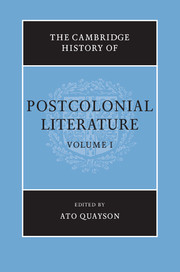Book contents
- Frontmatter
- 1 Introduction: postcolonial literature in a changing historical frame
- 2 Postcolonial fictions of slavery
- 3 Postcolonialism and travel writing
- 4 Missionary writing and postcolonialism
- 5 Postcolonial auto/biography
- 6 Orality and the genres of African postcolonial writing
- 7 Canadian literatures and the postcolonial
- 8 Postcolonialism and Caribbean literature
- 9 Postcolonialism and Arab literature
- 10 Postcolonialism and postcolonial writing in Latin America
- 11 Postcolonial writing in South Africa
- 12 Postcolonial literature in Southeast Asia
- 13 Postcolonial South Asian poetry
- 14 Postcolonial writing in India
- 15 Postcolonial writing in Australia and New Zealand
- 16 Indigenous writing in Canada, Australia and New Zealand
- 17 Postcolonial writing in Ireland
- 18 Postcolonial writing in Britain
- 19 Postcolonial writing in France
- 20 Postcolonial writing in Germany
- References
13 - Postcolonial South Asian poetry
Published online by Cambridge University Press: 28 January 2012
- Frontmatter
- 1 Introduction: postcolonial literature in a changing historical frame
- 2 Postcolonial fictions of slavery
- 3 Postcolonialism and travel writing
- 4 Missionary writing and postcolonialism
- 5 Postcolonial auto/biography
- 6 Orality and the genres of African postcolonial writing
- 7 Canadian literatures and the postcolonial
- 8 Postcolonialism and Caribbean literature
- 9 Postcolonialism and Arab literature
- 10 Postcolonialism and postcolonial writing in Latin America
- 11 Postcolonial writing in South Africa
- 12 Postcolonial literature in Southeast Asia
- 13 Postcolonial South Asian poetry
- 14 Postcolonial writing in India
- 15 Postcolonial writing in Australia and New Zealand
- 16 Indigenous writing in Canada, Australia and New Zealand
- 17 Postcolonial writing in Ireland
- 18 Postcolonial writing in Britain
- 19 Postcolonial writing in France
- 20 Postcolonial writing in Germany
- References
Summary
There are four points that must be made early about South Asian English poetry. First, the category of South Asia, while convenient, may do dis-service to those nations, Pakistan and Bangladesh, whose very raison d’être is their separateness from India and each other. The second is that these three countries do share a common political, literary and cultural history with India (as do Sri Lanka, Nepal and Bhutan) and therefore need to be distinguished only after 1947; hence, this chapter will look at pre-independence subcontinental poetry as a separate category, while looking at post-independence poetry in terms of the nations. The third is that Indian English poetry dominates the others in South Asia, having a much larger corpus. The fourth is that though we are dealing with South Asian English poetry, no such English really exists or is used by the poets except for comic purposes.
Pre-independence subcontinental poetry
The subcontinent saw the flowering of Indian English poetry very early (travel memoirs came even earlier) – in the 1820s. To give a sense of perspective, the British Empire was thirty-odd years away, as were the first universities in India; Macaulay’s famous ‘Minute on Indian Education’ would be written in 1835 and implemented even later. But the East India Company was already in India, and the people of Kolkata (known as Calcutta till recently), which was a cauldron of languages, races, and commercial and cultural possibilities, had already decided that English would be the language of power and emancipation.
- Type
- Chapter
- Information
- The Cambridge History of Postcolonial Literature , pp. 385 - 411Publisher: Cambridge University PressPrint publication year: 2012



